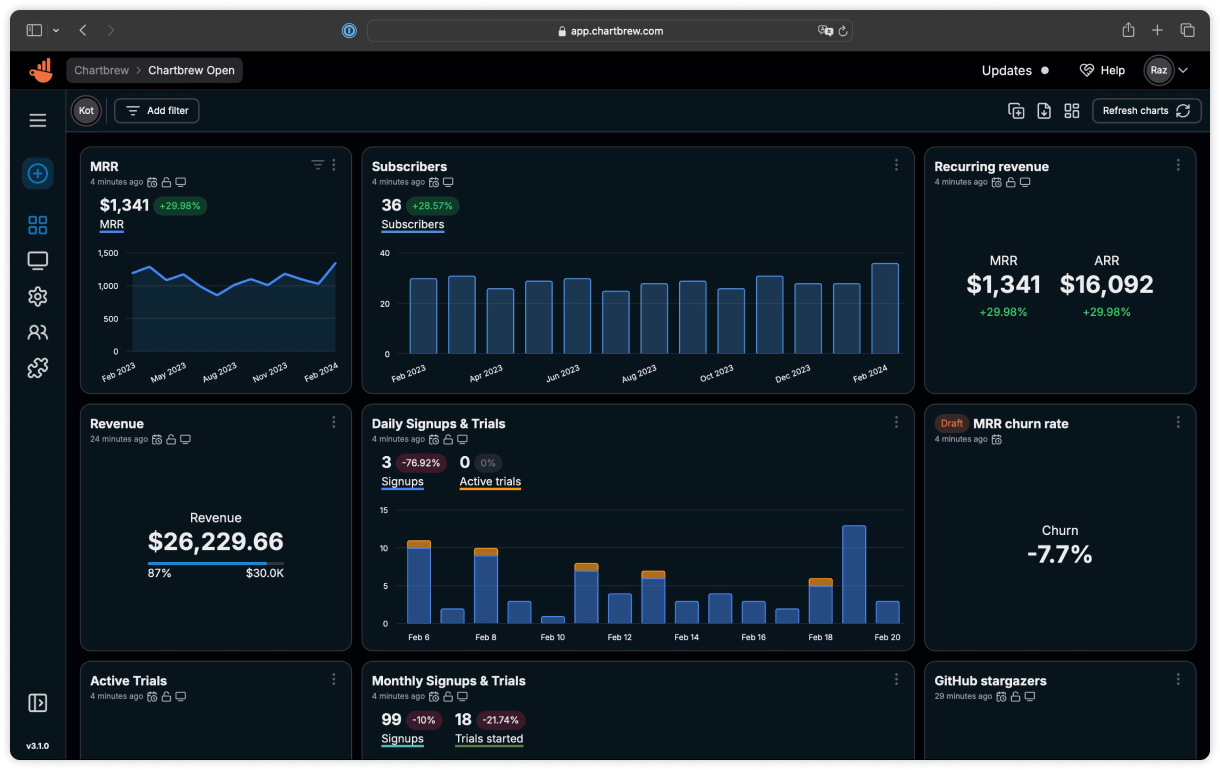Open-source web platform used to create live reporting dashboards from APIs, MongoDB, Firestore, MySQL, PostgreSQL, and more 📈📊
Chartbrew is an open-source web application that can connect directly to databases and APIs and use the data to create beautiful charts. It features a chart builder, editable dashboards, embedable charts, query & requests editor, and team capabilities.
Chartbrew as a service is available here
💡 Have any ideas or discussion topics?
Data sources
Check Chartbrew’s website for the latest list of supported data sources
Prerequisites
- NodeJS v20
- MySQL (5+) or PostgreSQL (12.5+)
- Redis (v6+)
Start
It is recommended you head over to the more detailed documentation to find out how to set up Chartbrew
Set up Chartbrew locally
Create a new database
Chartbrew can run on MySQL or PostgreSQL. Create an empty database that Chartbrew can use.
Clone and setup
git clone https://github.com/chartbrew/chartbrew.git
cd chartbrew && npm run setup
Complete the required environmental variables in chartbrew/.env. Check out which need to be set here.
Run the project in Development
Open two terminals, one for front-end and the other for back-end.
# frontend
cd client/
npm run start
# backend
cd server/
npm run start-dev
Head over to http://localhost:4018 to see the app running and create your first user account.
Deploy Chartbrew on Render
Deploy Chartbrew on Heroku and Vercel
Read more on how to do this here
Run with Docker
Check the full guide in the docs.
Quickstart
A Chartbrew docker image is built whenever a new version is released.
Before running the commands below, make sure you have a MySQL server already running and an empty database that Chartbrew can use. The database name should match the value of the CB_DB_NAME variable.
You will need a 32 bytes AES encryption key for the CB_ENCRYPTION_KEY variable. Run the following command to generate one:
node -e "console.log(require('crypto').randomBytes(32).toString('hex'))"
docker pull razvanilin/chartbrew
docker run -p 4019:4019 -p 4018:4018 \
-e CB_ENCRYPTION_KEY=your_32_bytes_key \
-e CB_API_HOST=0.0.0.0 \
-e CB_API_PORT=4019 \
-e CB_DB_HOST=host.docker.internal \
-e CB_DB_PORT=3306 \
-e CB_DB_NAME=chartbrew \
-e CB_DB_USERNAME=root \
-e CB_DB_PASSWORD=password \
-e CB_REDIS_HOST=host.docker.internal \
-e CB_REDIS_PORT=6379 \
-e CB_REDIS_PASSWORD=password \
-e VITE_APP_CLIENT_HOST=http://localhost:4018 \
-e VITE_APP_CLIENT_PORT=4018 \
-e VITE_APP_API_HOST=http://localhost:4019 \
razvanilin/chartbrew
Acknowledgements
Many thanks to everybody that contributed to this open-source project 🙏



